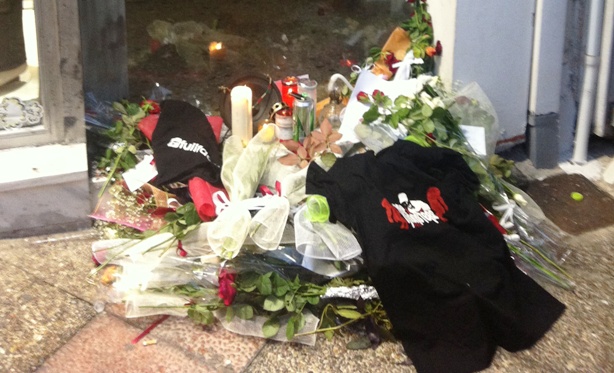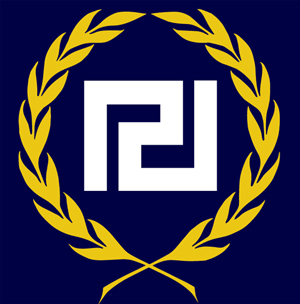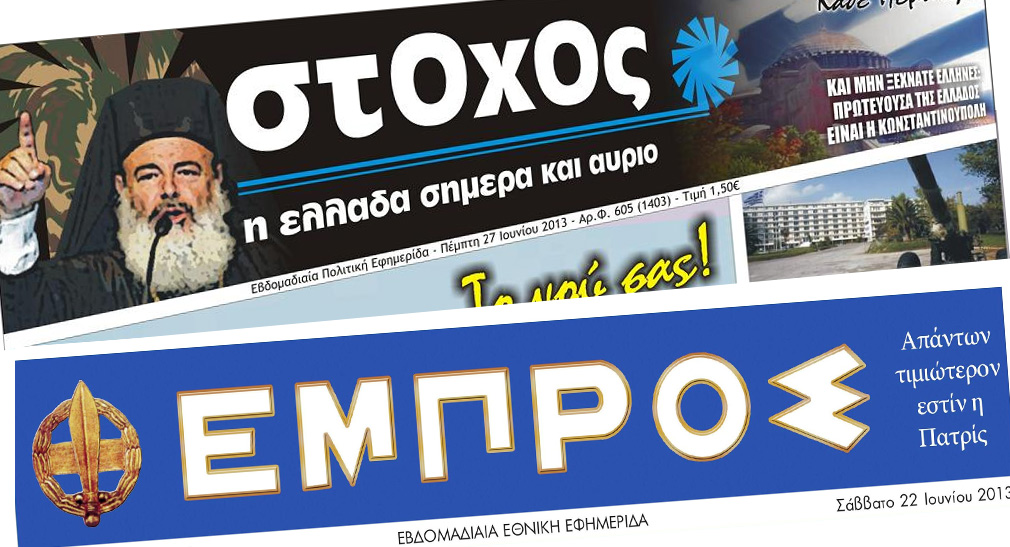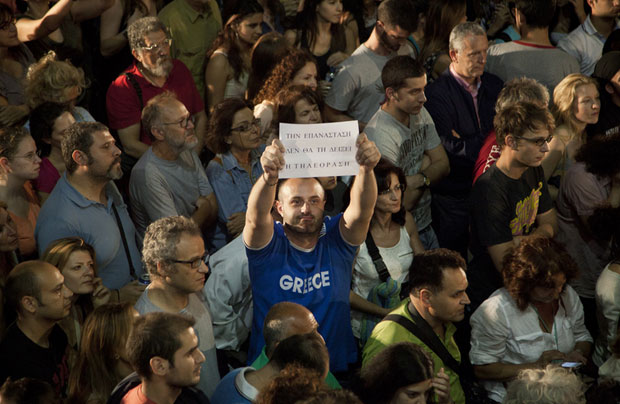19 Sep 2013 | Europe and Central Asia, Greece, News

Tributes to murdered activist Pavlos Fyssas (pic: Christos Syllas-Dellis)
Thousands of protesters gathered on Wednesday evening in Athens near the place where Pavlos Fyssas, a 34 year-old antifascist hip hop artist was murdered by a Golden Dawn supporter.
“The blood is running, it seeks revenge”, they shouted, a slogan echoing the December 2008 riots , when 15 year-old student Alexandros Grigoropoulos was killed by two policemen.
The 45 year-old man who carried out the stabbing has told police that he was a supporter of far-right party Golden Dawn. This was clearly a politically motivated killing, added to a sequence of intimidation events and attacks carried out by Golden Dawn against immigrants and asylum seekers.
On 17 January, Shehzad Luqman, an immigrant worker from Pakistan was lethally stabbed by two men. Police later found pre-election pamphlets of Golden Dawn in the house of one perpetrator.
In December 2012, Amnesty International reported on this issue. In addition, Human Rights Watch has found that there is evidence connecting the attackers on immigrants with members of or affiliated with far-right groups such as Golden Dawn.
No matter how useful these findings may be, they were clearly not at the “agenda” of the rally at Keratsini. Young and old antifascists, together with immigrants, have been increasingly struggling with Golden Dawn vigilantes in the past five years. The murder of Fyssas comes as no surprise. A lot of people somehow anticipated the tragic event.
“The regime, in co-operation with Golden Dawn is clearly escalating the confrontation with political dissidents. This is why we’re here today. And we have to step up the intensity of this political struggle. Everywhere,” said a demonstrator, local resident of Keratsini.
Some 3,000 – 4,000 members of an organised anarchist block was heading towards Golden Dawns’ offices in Nikaia, while at the same time, demonstrators attacked Keratsini’s police station. Almost instantly clashes began: Riot police squads tried to disperse groups of demonstrators with the typical use of excessive force.
In an alley, the head of a police squad was heard shouting “Come on, let’s go and fuck them up”. Middle-aged people from the neighborhood curesed them, while young antifascists threw Molotov cocktails and stones.
Keratsini district, a working class neighborhood, was established after Greek refugees fled Asia Minor on 1922. The greater area of Piraeus (Nikaia, Perama, Keratsin), known for its anti-Nazi struggle, was historically affiliated with the political left.
This picture though seems to be fading away. According to polling company “Public Issue”, Golden Dawn has doubled its electoral influence on these areas. Moreover, it has worked its way on socially penetrating existing political views.
On June 2012, Egyptian fishermen were attacked in Perama after an inflammatory and racist speech by Golden Dawn MP Yannis Lagos, who said that the party would hold them accountable for their actions. A few days ago, again in Perama, members of the Communist Party (KKE) were brutally attacked by Golden Dawn’s supporters while putting up posters for an upcoming festival.
Last nights’ clashes have led to a total of 130 detentions and 34 arrests while tweeters were reporting a demonstrator had been heavily injured by a direct teargas shot. Questions about the way police responded at the place of the assassination remain unanswered. Witnesses on TV broadcasts this morning said that police were reluctant to involve at the fight before the stabbing.
There were protests against the murder throughout the country. Latest reports suggest that there have been discussions on emergency legislation to ban Golden Dawn’s acts.
This article was originally published on 19 Sept 2013 at indexoncensorship.org
19 Aug 2013 | Greece, News, Politics and Society, Religion and Culture
 Media coverage of neo-fascist Golden Dawn’s activities in recent weeks has focused on the Nazi anthem played at a food distribution event the party held or the swatstika tattooed arm of a party spokesperson Ilias Kasidiaris. It’s all portrayed as another lifestyle, albeit with a fascist tint.
Media coverage of neo-fascist Golden Dawn’s activities in recent weeks has focused on the Nazi anthem played at a food distribution event the party held or the swatstika tattooed arm of a party spokesperson Ilias Kasidiaris. It’s all portrayed as another lifestyle, albeit with a fascist tint.
But these incidents are evidence of a continuing and alarming political reality that no Greek or European can turn a blind eye to.
It’s been argued that the fascism emerging today is the result of long-term political and social trends. Right wing populists, far rightists and independent extremists all share – more or less – a common principal: They see immigration, ethnic diversity and religious freedoms as a threat to national cohesion.
It is in this context that the neo-fascist party carries out its actions against groups that violate its perceptions of the Greek nation. These “dissidents” include anti-fascists, anarchists, leftists, homosexuals and immigrants. Since the outset of the economic crisis, the party has managed to persuade some of the impoverished middle and working classes that it speaks for them.
George Pleios, head of the Department of Communication and Media Studies Faculty at the University of Athens, has recently written about the political affinities of the “right” and the “far-right” spectrum and their culture of political intolerance, either in or outside parliament.
“There is a common ideological reservoir whereby far-right MPs and proponents of right-wing extremism express their political views and plan their political actions. For them national identity comes first. There is no room for individual rights. Nobody is entitled to any other belief than the nation and the race”.
Within Greece, there is speculation that New Democracy will cooperate with Golden Dawn at some point. Pleios considers that a possibility.
“Everything is possible. In that case, of course, many political compromises must be made. Both parties would never want to experience severe election loss”, he said.
Golden Dawn entered the Greek Parliament in 2012 with an unprecedented 6.92% of the vote. The party’s poll ratings have reached 18% in recent days. During this time, there has been a strong legitimisation of their rhetoric, mainly emanating from the right wing political spectrum.
At first glance, the picture one gets from the parliamentary discourse is that Golden Dawn is heavily criticized with its back against the wall. Not so long ago, there was discussion of banning the party. In May, the Greek Prime Minister Antonis Samaras held talks around an anti-racism bill that was aimed at slowing the growth of the party.
A more careful look though, suggests differently. According to a report from Dimitris Psarras, investigative journalist at “The Journalists’ Newspaper” (Efimerida Ton Sintakton), many far-rightists and junta nostalgics that survived politically throughout the years, today surround the Greek prime minister as associates, advisors or New Democracy party members.
Makis Voridis, recently appointed as special representative on migration to the OSCE Parliamentary Assembly, has been defending Savvas Hatziparaskeyas, publisher of the far-right newspaper “Stohos” and a strong supporter of Golden Dawn.
In the1980s Voridis served as secretary of EPEN’s youth wing, succeeding Nikos Michaloliakos, who is Golden Dawn’s general secretary. EPEN was a fascist party founded by Georgios Papadopoulos, the head of the military coup d’état, which ruled Greece from 1967-1974.
Another connection between some New Democracy members and Golden Dawn comes from the writings of Failos Kranidiotis, an unofficial advisor to Samaras. On 12 December 2012 Kranidiotis wrote that New Democracy should appeal to populist “Independent Greeks” as well as to Golden Dawn. “These are mainly our people”, he wrote.
A few months later, Panayotis Baltakos, the government’s general secretary, allegedly said that cooperation between New Democracy and Golden Dawn in upcoming elections is “undesirable but not an unlikely possibility”. Last December, Baltakos had told the National Commission for Human Rights that regarding the committee’s work on human rights and the country’s international obligations “he doesn’t care in his capacity as a representative of the government and New Democracy”.
On 1July, former minister Vironas Polydoras, when asked whether New Democracy should cooperate with the neo-fascist party said:
“Of course…”.
Moreover he insisted that the troika — the European Union, the International Monetary Fund and the European Central Bank– not Golden Dawn, poses the greatest threat to Greece.
In response, Anna Asimakopoulou, a spokesperson for New Democracy, said that the party “would never work with neonazis”.
Golden Dawn has also fostered relationships with some orthodox religious groups and bishops belonging to the Greek Orthodox Church. At the same time, the party has targeted performers and topics that it does not agree with.
In March 2013, journalist Matthaios Tsimitakis reported for Index on Censhorship what happened when the controversial theatrical play “Corpus Christi” went on stage:
“For about a month, the actors and other workers at the Hitirion Theatre had to take precautions to protect themselves from threats against their lives and violent attacks by Orthodox religious groups and Golden Dawn”.
Golden Dawn has made its position on the arts that don’t fit with the party’s philosophy clear.
“Abolition of state subsidies and the marginalization of the ‘artists’ that offend ethnic, religious and historical symbols”. – from a Golden Dawn political leaflet (p. 22)
Greek Orthodox clerics like Bishop Amvrosios of Kalavryta and Bishop Seraphim of Piraeus have openly expressed their support of Golden Dawn. Both of them have often spoken out against Jews and homosexuals, though their viewpoints are at odds with other members of the church hierarchy.
On 15 July, Amvrosios wrote on his blog that “we have to rise up” because “we have been sold out a long ago. We are Jewish occupied”. In an older post he writes about the “imminent threat” of Islam saying, “Islam does not play around”.
In much the same spirit, Golden Dawn’s rhetoric contains islamophobic and anti-semetic propaganda.
“1400 year old tradition of Jihad has reached Europe, as well as Greece, and is ready to conquer the continent and our country”, says a recent article on Golden Dawn’s official website entitled “Enemy at The Gates: Islam as a Trojan Horse of New Order”.
In June, the Muslim Association of Greece received a threatening note with the emblem of Golden Dawn printed on it. All Muslims, Greeks and foreigners, were given one month’s time (until 30 June) to leave the country otherwise they would be “slaughtered like chickens”.
Golden Dawn denied any connection with the note, calling it a provocation to the party.
Greece’s next legislative election is due to be held by 2016. What Golden Dawn’s role will be is an open question.
This article was originally published at on 19 Aug, 2013 indexoncensorship.org. Index on Censorship: The voice of free expression
2 Jul 2013 | Europe and Central Asia
Taking their cue from the neo-nazi Golden Dawn, Greece’s far-right newspapers have recently been targeting alternative opinions. While hardly breaking news, the language and symbolism of the campaign is of vital importance because it represents just the tip of the iceberg, Christos Syllas writes

Greece’s far right newspapers have been targeting groups they see as “anti-Greek”
The rise of the Golden Dawn and its campaign against groups it perceives to be anti-Greek — leftists, immigrants, gays and lesbians — has encouraged nationalist and far-right sympathisers to spread their ideologies through existing and new media outlets both online and off.
On 6 June, for instance, the far-right publication Stohos, or Target, mocked Tasos Theodoropoulos for being “a self-proclaimed gay” who criticised a bishop’s persistent attempts to abolish a gay pride festival. Theodoropoulos had called the bishop a “flowery priest’s wife”. The turn of phrase apparently hit a conservative nerve.
Theodoropoulos, who was beaten shortly after the paper blasted him, wrote about his terrifying experience and suggested an explanation for the attack.
“They maybe didn’t know me. Even if they didn’t, newspapers like ‘Stohos’ have succeeded in helping them recognise me, as a target”.
Stohos is a far-right newspaper with a history of offensive and abusive language. It has always held anti-communist views, defended the Greek Orthodox church and launched campaigns against ‘anti-Greek’ sentiments. Its publisher, Savvas Hatziparaskeyas, was sentenced to 10 months in prison for repeatedly libelling the Migrants’ Forum in Crete (MFC).
In that case, Stohos had accused two MFC members of “unpatriotic plotting intended to cause chaos and unrest” and appealed to Greek residents of Crete to break “this abcess”. MFC won its case against Hatziparaskeyas in September 2012.
In a telephone interview on 26 June, Dimitris Psarras, known for his prominent investigative journalism on Golden Dawn and on the far-right spectrum, shared some of his thoughts about the violence encouraged by far-right publishers:
“Stohos has been following for years the method of targeting people and journalists. I remember that back in the nineties, while reporting as a member of ‘Ios’ (an investigative journalistic team), we were denounced as ‘traitors’, ‘agents’ and ‘people who should leave Greece immediately’. At the time we were reporting on the protection of minorities and on human rights issues. Even though we largely documented our stories on decisions from Greek or European courts, they wouldn’t stop. I recollect several open calls for violent deeds from nationalists and far-rightists. However, attacks and conflicts were disproportionate to the calls.”
The “anti-Greek” foreigner
Far-right publications have rejected voices considered to undermine “the purity of the Greek race and the glory of the nation.” And such publications also find “any distortion of religious beliefs” or support for the rights of immigrants to be unacceptable.
Indymedia Athens, for example, is a local collective of grassroots activists that heavily criticises Golden Dawn’s practises and nationalist ideas. For publishing calls for pro-immigrant rallies, and condemning racist attacks against immigrants, far-right voices have labelled the group as a “cesspit” and its members “snitches” and “employees of billionaire George Soros.”
The notion of being supported by ‘foreign’ funding is part of building a case that groups like Indymedia are part of an external threat. According to far-right rhetoric, anarchists and antifascists with the support of left-wing Syriza are anti-Greeks who must be fought. A far-right blog called Maiandrioi has previously made such a call to arms:
“We invite all Greeks in blood and soul, to be awake and military ready… in days to come, anti-Greeks will reveal their real face and they will jointly fight against Greeks.”
Golden Dawn recently published a newspaper called Embros. Next to the main story calling for Golden Dawn victories in upcoming mayoral elections there was a photograph with children holding placards during a pro-immigrant rally. The caption underneath read: “foreign criminals thresh in Athens”. Insulting language for immigrants and children does not come as such a great surprise.
Artist Panayiotis Hatzistefanou wrote a piece entitled “Why I am anti-Greek” on 15 May, where he said that he can no longer stand to hear homophobic, racist, and far-right remarks in a country falling apart. Without hesitation Stohos attacked him for the piece, calling for his citizenship to be revoked.
It is worth noting that newspaper Stohos targeted Paris Karvounopoulos, an experienced military journalist. After publishing a piece critical of Frangos Frangoulis, a former chief of the Hellenic Army general staff and former minister for national defense, Karvounopoulos found himself reprimanded by “Stohos”. The title of that story was a call to Frangoulis: “General, if you must f*#k people up, start from him”.
Κarvounopoulos, however, claimed on 26 June that the former general had previously spoken against his self-proclaimed supporters.
“Lawsuit industry”
At the same time, far-right targeting seems to have another dimension. Many argue about the building of a “lawsuit industry” by extreme right-wingers to those opposed to far-right viewpoints. Savvas Michail, general secretary of EEK, the Revolutionary Labor party, was sued by Golden Dawn because he labelled it as a nazi organization that attacks immigrants.
Katerina Thoidou, a journalist for the newspaper Workers’ Solidarity and anti-fascist activist (member of KEERFA, Movement Against Racism and Fascism Threat) was sued by Ioannis Andriopoulos, a lawyer who offers his services to a Golden Dawn MPs. Andriopoulos says that Thoidou insulted him by calling him “a fascist”.
Thoidou had used the label when Andriopoulos’ petition prompted the Greek Council of State to declare the country’s citizenship law (L. 3838/2010) unconstitutional. The law had been criticised for easing the process for citizenship, which moderate critics saw as an effort by political parties to gain the votes of newly-minted Greeks.
Thoidou, said in a telephone interview on 26 June, that recent targeting of journalists and people who oppose the Golden Dawn can be explained: “It is clearly an orchestrated effort to silence journalists reporting on Golden Dawn’s attacks on immigrants and homosexuals. The exposure of such incidents results in uncomfortable pressure not only against the ‘typical’ far-right advocates but against the government”.
Christos Syllas is a freelance journalist. Tweets from @csyllas
12 Jun 2013 | Europe and Central Asia, Greece, News

Greeks protested their government’s decision to shutter public broadcaster ERT. (Photo: MICHALIS MICHAILIDIS/Demotix)
It happened so quickly, few people inside Greece, and fewer watching from outside could comprehend it. Antonis Samaras, prime minister and leader of the Greek coalition government, announced that the state TV channel ERT, the equivalent of the BBC, would be shut down from midnight on 11 June. Dawn Foster reports.
The caveats provided little relief — Samaras claimed ERT would reopen, with far slimmer staffing levels than the current 2,656 journalists it currently employs across the country.
The plug would be pulled at midnight, Samaras announced a few hours before. Citizen journalists reported seeing riot police marching to transmitters, and ERT offices in Athens, Thessaloniki and beyond were surrounded by riot police, stopped only by the huge crowds of protestors who quickly thronged the streets in fury at the shock decision.
Index on Censorship Chief Executive Kirsty Hughes commented today: “The sudden closure of Greek public broadcaster ERT by the government shows an attitude to media freedom that is extremely troubling. Throughout the Greek economic crisis the authorities have been eager to shoot the messengers, whether they be ERT employees or Kostas Vaxevanis, publisher of the ‘Lagarde list’. Narrowing the discussion through undermining free media will not solve Greece’s problems”
ERT journalists responded by occupying their buildings, and continuing to transmit wherever possible. After years of criticism for often acting as little more than an adjunct of government communications, ERT journalists became vociferous in their criticism of politicians, and government policy. The economist Yanis Varoufakis, admitted live on air that he had been banned from appearing on ERT by a PASOK spokesperson after stating that Greece needed to restructure its debt:
“…as you know, your government bosses had me blacklisted from this station ever since I refused to keep quiet about Greece’s bankruptcy. That act of totalitarianism was a prelude to the much grosser one that we are experiencing tonight. Clearly, I am not the person to say that ERT was a splendid organisation unblemished by censorship, political interference or corruption. But I think I am the person possessing the moral authority to stand here tonight in front of you and say that, despite all its ills, the totalitarian manner in which ERT was closed down was a crime against all civilised people the world over.”
The president of the European Broadcasting Union, Jean Paul Philipott, roundly condemned Antonis Samaras’s decision and urged the Greek government to reverse the shutdown with immiediate effect noting: “The existence of public service media and their independence from government lie at the heart of democratic societies, and therefore any far-reaching changes to the public media system should only be decided after an open and inclusive democratic debate in Parliament — and not through a simple agreement between two government ministers.”
Samaras and New Democracy have attempted to justify the censorship of state broadcasting by arguing that the shutdown was necessary to meet public sector redundancy targets set by the Troika, due to be re-examined at the end of July.
For many Greeks, the closure carries memories of the junta. The military dictatorship’s rule is still within living memory of many Greeks, and blank screens were often a precursos to another coup. Several ERT journalists, and opposition leader Alexis Tsipras of SYRIZA referred to the move as a “coup”, a particularly loaded term in Greece. Tsipras told protesters assembled outside an ERT station “This is completely illegal … The government has overstepped its authority. You can’t do this without parliamentary approval, it’s an issue of democracy.”
ERT journalists broke ranks in their anger at the sudden clampdown, speakig candidly on air, and outside ERT buildings of the pressure to bring government ministers on air and silence dissenting voices.
Samaras’s decision to shut down ERT with force, and without consultation with coalition partners PASOK and Democratic Left, has been widely described as inherently undemocratic. It remains to be seen whether the row will force a political crisis in the coalition, or if it heralds much wider, and more drastic sackings across the Greek public sector.
Dawn Foster works for the Guardian’s Comment is Free. She tweets at @DawnHFoster


 Media coverage of neo-fascist Golden Dawn’s activities in recent weeks has focused on the
Media coverage of neo-fascist Golden Dawn’s activities in recent weeks has focused on the 
